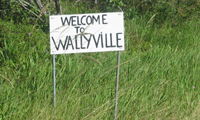From the Kitchen #8
 Humans seem to be driven by the need for an explanation for everything. This makes us curious about how things work and also leads us to pat answers. Sometimes any explanation appears to satisfy some people.
Humans seem to be driven by the need for an explanation for everything. This makes us curious about how things work and also leads us to pat answers. Sometimes any explanation appears to satisfy some people.
I’ve written elsewhere (as have others) that it is useless to have answers to the wrong questions. It’s worse than useless, because if the answers seem satisfactory, we stop asking.
We are daily confronted with enormous issues and myriad smaller ones: climate change, financial debacles, environmental degradation, armed conflict, violence on the streets, drug abuse, homelessness, deaths on the roads, swine flu and what’s for dinner. Some of these remain seemingly intractable because of a lack of political will. Most are not being dealt with effectively because the wrong questions are being asked.
Global warming is now being blamed for any deviation from the average weather: ‘early’ winter in parts of South America, ‘heat waves’ (32º C) in Britain; and events such as fire storms in Victoria and California, damage to the Great Barrier Reef and the failure of my neighbour’s soufflé.
I lay no claim to knowing what all the right questions are, but asking how we can pull excess CO2 out of the atmosphere and sequester it underground is not a useful question. Saying that we can do so and make a difference to the warming globe is dishonest. Questions about how to reduce the amount we spew into the atmosphere in the first place would be more useful.
To regard the environmental issues and the economy as competing also indicates a failure to ask the right questions. On the other hand, we could usefully ask questions about reducing our destructive impact on our environment in a way that will also increase employment opportunities and improve the community’s economic, social and health status.
We are too often fed information that seems to have no connection with any questions, useful or otherwise. People are reported as dying of swine flu when it is likely that the flu was able to establish a hold because these people were already very ill. That is not to deny that swine flu itself kills some people, nor that the deaths may be tragic for those close to the deceased. Another example is the road toll: anyone who dies in connection with a collision is counted as adding to the road toll, whereas some die of a heart attack or stroke and then their car collides with something. They are, however, counted as road casualties. It makes a mockery of the statistics we are asked to care about.
There are people, although deplorably few, who have been asking useful and important questions on issues such as the unfettered trading in derivatives and other phantoms, and offering valuable answers. Unfortunately, those who had the power to make a difference ignored these answers as not fitting with the questions they themselves were misguidedly asking. Result: a global financial fiasco.
Despite the glorious winter weather, I’m angry and dismayed. The Productivity Commission has been looking at the ‘issue’ of parallel importation of books in Australia. The current law forbids the importing of books from overseas while the same titles are available as local imprints. This prevents ‘dumping’ of overseas editions and ensures that local authors can earn higher royalties. The Commission’s inquiries have been in part based on the question: ‘How can we reduce the price of books in Australia?’ The premise is that allowing UK and USA editions in, would reduce the price. Amazon and other internet ‘shops’ notwithstanding, there is no clear evidence of this. And need books be cheaper? Australia has one of the highest level of book sales per capita. Someone on the inquiry panel even had the gall to suggest that writers really do not need to be paid, because of the pleasure they gain from writing and from being published. I would like to see that argument applied to everyone else who enjoys their labour, including politicians and members of the Commission; oh, and people working for the bookshop chain that has been one of the forces behind the inquiry. By the way, parallel importing of books is not allowed by the UK or the USA.
Back to the useful questions. Before asking ‘what can I do about …? (the economy, the environment, road tolls), it is useful to ask ‘why?’. Why does the economy need to grow a certain amount each year? Why should we not pollute? Why should books be cheaper? Why do I care?
© 2009 Daan Spijer
![]() CLICK HERE to download a formatted PDF of the above post
CLICK HERE to download a formatted PDF of the above post
![]() See more of Daan Spijer’s writing and his photos at Seventh House Communications
See more of Daan Spijer’s writing and his photos at Seventh House Communications
Part of this post has been reporduced on Saving Aussie Books blog.
Pingback by Cheaper Books? By Daan Spijer and Angela Sunde « SAVING AUSSIE BOOKS — October 22, 2009 @ 6:31 am